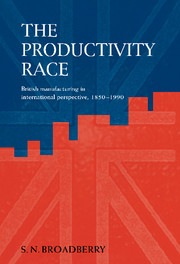Book contents
- Frontmatter
- Contents
- List of figures
- List of tables
- Acknowledgements
- Glossary of terms and company names
- 1 Introduction and overview
- Part 1 measuring comparative productivity performance
- Part 2 explaining compartive productivity performence
- 6 Technology
- 7 Economic geography: markets and natural resources
- 8 Accumulation of physical and human capital
- 9 Competition and adjustment
- Part 3 reassessing the performance of British industry
- Bibliography
- Index
9 - Competition and adjustment
Published online by Cambridge University Press: 28 October 2009
- Frontmatter
- Contents
- List of figures
- List of tables
- Acknowledgements
- Glossary of terms and company names
- 1 Introduction and overview
- Part 1 measuring comparative productivity performance
- Part 2 explaining compartive productivity performence
- 6 Technology
- 7 Economic geography: markets and natural resources
- 8 Accumulation of physical and human capital
- 9 Competition and adjustment
- Part 3 reassessing the performance of British industry
- Bibliography
- Index
Summary
Introduction
In chapter 6 it was noted when considering the competition between mass production and flexible production systems that there could be problems of adjustment if one system pulled sufficiently far ahead of the other. In a stochastic world, a process of trial and error may lead to improvements in one technology that cannot be incorporated in the lagging technology. If market forces were allowed to operate freely, this would result in the elimination of the inferior technique. However, the owners of the specific physical and human capital embodied in the inferior technique may resist this, and the outcome may depend on bargaining power in product and labour markets. Protection and cartelisation may be seen by firms as ways of obtaining product market power, enabling them to resist unfavourable technological change. Similarly, trade unions may be able to use monopoly power in the labour market to block unwelcome changes in work practices. Furthermore, the operation of capital markets may have important implications for the removal of underperforming management.
It should be noted, however, that this does not amount to a general presumption that high levels of concentration, protection or unionisation must always be associated with poor performance. Rather, it is a more limited argument that market power may hinder adjustment in difficult circumstances. Competition is not an accumulation strategy in itself, but it may make the transition from an unsuccessful to a successful strategy easier to achieve.
- Type
- Chapter
- Information
- The Productivity RaceBritish Manufacturing in International Perspective, 1850–1990, pp. 129 - 154Publisher: Cambridge University PressPrint publication year: 1997



